Showing Agreement or Disagreement | Spanish: Beginner A1 Level - Class 6 PDF Download
How to Agree, Disagree, and Express Your Opinion in Spanish
Have you ever been in a situation where it was necessary to express your opinion in Spanish? Today I will review useful expressions you can use to disagree or agree in Spanish according to the situation.
We’re always eager to let everyone know what we think when we’re having a conversation, and we might have a hard time expressing our opinion when we don’t speak the native language.
40 Ways to Agree in Spanish
¡Claro que sí!
Of course!
As you may have noticed, Spanish is a highly rich language so it won’t surprise you to find multiple ways to express the same idea in Spanish.
If you want to agree in Spanish, you can simply say absolutamente, which means “absolutely.” Additionally, here you will find more other phrases you can say to communicate the same absolute agreement.
1. ¡Absolutamente! – Absolutely!
¿Tengo razón o no?
—¡Absolutamente!
Am I right or not?
—Absolutely!
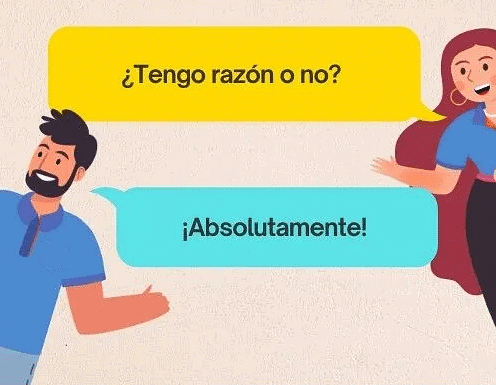
2. ¡Claramente! – Clearly!
¿Es verdad?
—¡Claramente!
Is it true?
Clearly!
3. Exactamente. – Exactly.
Todos podemos opinar.
—Exactamente.
We can all express our opinion.
—Exactly.
4. Es una buena idea. – It’s a good idea.
¿Qué piensan?
—(Es una) Buena idea; deberíamos considerarlo.
What do you think?
—(It’s a) Good idea, we should consider it.
¿Qué opinas?
—La verdad, es una buena idea.
What do you think?
—To be honest, it’s a good idea.
5. Buen punto. – Good point.
¿Tengo razón?
—Sí, buen punto.
Am I right?
—Yes, good point.
6. Estoy de acuerdo. – I agree.
¿Qué dices?
—Estoy de acuerdo.
What do you say?
—I agree.
More Phrases to Strongly Agree in Spanish
To emphasize that you agree “entirely,” you could say estoy completamente de acuerdo.
7. Estoy completamente de acuerdo. – I completely agree.
¿Qué opinas al respecto?
—Para ser honesto, estoy completamente de acuerdo.
What is your opinion about it?
—To be honest, I agree entirely.
Deberíamos tener una reunión mañana.
—Estoy de acuerdo con eso.
We should have a meeting tomorrow.
—I agree with that.
8. Estoy de acuerdo contigo. – I agree with you.
Pienso que eso no estuvo bien.
—Estoy de acuerdo contigo.
I think that was not okay.
—I agree with you.
9. No podría estar más de acuerdo. – I couldn’t agree more.
Eso fue excelente.
—No podría estar más de acuerdo.
That was excellent.
—I couldn’t agree more.
Phrases To Agree in Spanish in Formal Situations
When at a gathering with friends or family, you can agree in Spanish with these expressions.
10. Siento lo mismo. – I feel the same way.
No creo que eso sea just.
—Claro, siento lo mismo.
I don’t think that’s fair.
—Sure, I feel the same way.
11. Yo diría lo mismo. – I would say the same.
No deberíamos permitir que eso suceda.
—Exactamente, yo diría lo mismo.
We shouldn’t allow that to happen.
—Exactly, I would say the same.
12. Yo tenía la misma idea. – I had the same idea.
¿Por qué no hacemos un viaje?
—¡Yo tenía la misma idea!
Why don’t we make a trip?
—I had the same idea!
Phrases To Agree in Spanish Politely
In moments like job meetings or conversations with co-workers, or even your boss, we have these phrases for you.
13. No lo había pensado así. – I hadn’t thought of it like that.
¿Por qué no intentas de otra manera?
—Bueno, ¡no lo había pensado así! ¡Pero seguro!
Why don’t you try it some other way?
—Well, I hadn’t thought of it like that! But sure!
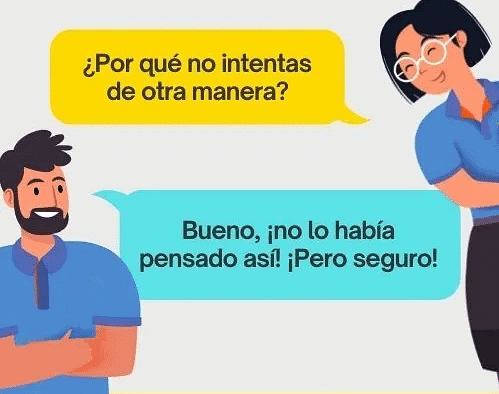
14. Estoy a tu favor. – I’m in your favor.
¿Quién está conmigo?
—Estoy a tu favor, por supuesto.
Who’s with me?
—I’m in your favor, of course.
15. Estoy de tu lado. – I’m on your side.
¿Del lado de quién estás en este team?
—Yo estoy de tu lado esta vez.
Whose side are you taking on this topic?
—I’m on your side this time.
16. ¡Me gusta! – I like it!
¿Qué piensan de esta propuesta?
—¡Me gusta! Es prometedora.
What do you think of this proposal?
—I like it! It’s promising.
17. Me gusta eso porque… – I like that, because…
Dame tu opinión sobre eso.
—Me gusta eso porque beneficia a todos.
Give me your opinion about that.
—I like that because it benefits everyone.
18. Comparto tu punto de vista. – I share your point of view.
Comparto tu punto de vista sobre este tema; es interesante.
I share your point of view on this topic; it’s interesting.
Phrases for Fluent Conversation
Some expressions can be useful when you want to let the other speaker know you’re listening intently. Check out these examples to agree in Spanish!
19. Yo pienso que sí. – I think so.
¿Crees que debería ir a la fiesta?
—Yo pienso que sí, te sentirás bien.
Do you think I should go to the party?
—I think so, you’ll feel well.

20. Pienso lo mismo. – I think the same.
Es una situación tan difícil.
—Pienso lo mismo, no sé qué hacer.
It’s such a difficult situation.
—I think the same, I don’t know what to do.
21. Veo / Entiendo lo que quieres decir. / Veo lo que quieres decir. – I see what you mean.
Esta situación debe cambiar.
—Entiendo lo que quieres decir; es muy complejo.
This situation should change.
—I see what you mean; it’s very complex.
22. Entiendo. – I understand.
Espero que entiendas mis razones.
—Entiendo, de verdad.
I hope you understand my reasons.
—I understand, honestly.
23. Puede ser. – It might be.
Es una posibilidad, ¿no crees?
—Puede ser.
It’s a possibility, don’t you think?
—It might be.
24. Es una idea interesante. – It’s an interesting idea.
Tuve esa idea anoche.
—Es una idea interesante, sabes.
I had that idea last night.
—It’s an interesting idea, you know.

25. Yo tampoco. – Neither did I.
No tenía pensado ir a la fiesta.
—Yo tampoco; ya es tarde.
I wasn’t planning on going to the party.
—Neither did I, it’s late already.
26. Sin duda. – No doubt.
Eso suena difícil.
—Sin duda es difícil.
That sounds hard.
—No doubt it’s hard.
27. Por supuesto. / Claro que sí. – Of course.
¿Tomarás vacaciones?
—Por supuesto; estoy cansado.
Will you take your vacation?
—Of course, I’m tired.
28. ¡Seguro! – Sure!
¿Crees que debería hacerlo?
—¡Seguro! Hazlo.
Do you think I should do that?
—Sure! Do it.
29. Yo también. – So do I. / Me too.
Quiero irme de viaje.
—Yo también; quiero conocer Europa.
I want to go on a trip.
—So do I. I want to know Europe.
30. Eso me parece bien. – That seems good to me.
¿Dividimos la cuenta?
—Eso me parece bien; es justo.
Should we split the bill?
—That seems good to me, it’s fair.
31. Eso es justo lo que estaba pensando. – That’s just what I was thinking.
¿Ordenamos comida?
—¡Eso es justo lo que estaba pensando! Quiero pizza.
Should we order food?
—That’s just what I was thinking! I want pizza.
32. Eso es cierto. – That’s true.
Él es muy talentoso.
—Eso es cierto, canta bien.
He’s very talented.
—That’s true, he sings well.
33. Lo que estás diciendo tiene sentido. – What you’re saying makes sense.
¿Crees que es lógico?
—Lo que dices tiene sentido si soy sincero.
Do you think it’s logical?
—What you’re saying makes sense if I’m honest.
34. Estamos en la misma página. / Estamos en sintonía. – We’re on the same page.
Espero que me entiendas.
—Estamos en sintonía, no te preocupes.
I hope you understand.
—We’re on the same page, don’t worry.
35. Sin duda alguna. – Without a doubt.
¡Qué buen día tuvimos!
—Sin duda alguna; tuvimos éxito.
What a good day we had!
—Without a doubt; we were successful.
36. Sí; además… – Yes, and…
Ese fue un buen partido.
—Sí; además fue casi un empate también.
That was a good game.
—Yes, and close to a tie too.
37. Podrías estar en lo correcto. – You may be right.
Deberías tomar mi consejo.
—Podrías estar en lo correcto; lo intentaré.
You should take my advice.
—You may be right; I’ll try.
A similar yet stronger expression can be tienes mucha razón.
38. Tienes mucha razón. – You’re very right.
Fue un gran error.
—Tienes mucha razón. Lo arreglaré.
It was a big mistake.
—You’re very right. I’ll fix it.
39. Diste en el clavo. – You hit the nail on the head.
Es sólo mi punto de vista.
—Diste en el clavo, sin duda.
That’s just my point of view.
—You hit the nail on the head, no doubt.
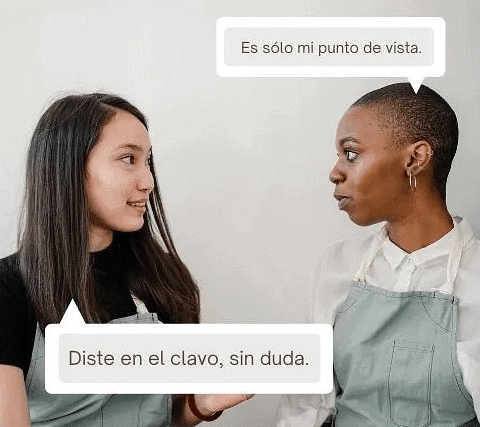
40. Tienes razón. / Estás en lo correcto. – You’re right.
Ese fue un día duro en el trabajo.
—Tienes razón, merecemos un descanso.
That was a hard day at work.
—You’re right, we deserve a break.
41 Ways to Disagree in Spanish
¡Claro que no!
Of course not!
Disagreeing is not always a comfortable situation, but it is necessary to have honest and concrete discussions about important topics. I’ve prepared an amazing list of expressions to disagree in Spanish for you.
Straightforward Phrases To Disagree in Spanish
Sometimes, we have to be radical in disagreeing to make our point, check out these absolutamente no phrases.
1. Absolutamente no. – Absolutely not.
¿Es posible tomarme el día libre?
—Absolutamente no; hay mucho trabajo por hacer.
Absolutely not, there’s too much work to do.
—Is it possible that I take the day off?
2. ¿Estás hablando en serio? – Are you being serious?
Eso no estuvo tan mal.
—¿Estás hablando en serio? Es inaceptable.
That wasn’t so bad.
—Are you being serious? It is unacceptable.
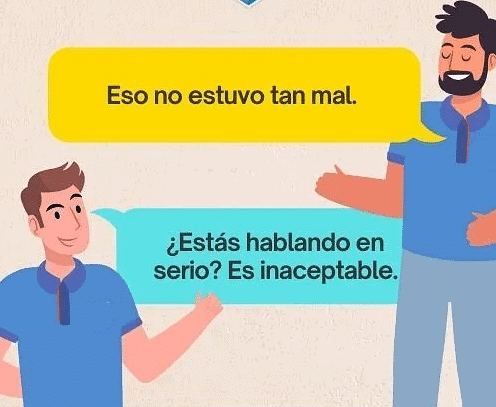
Phrases to Express Nonconformity
In some situations, we can express our nonconformity in more subtle ways. Words such as dudosamente indicate that you are not quite happy about some opinion or situation.
3. Dudosamente. – Doubtful.
¿Crees que pueda cancelar el plan?
—Dudosamente, ya está todo arreglado.
Do you think I can cancel the plan?
—Doubtful, everything is all set up.
4. Me permites diferir. – I beg to differ.
Los datos están claros.
—Me permites diferir; algunos son incorrectos.
The data is clear.
I beg to differ; some are incorrect.
5. No puedo estar de acuerdo con eso. – I can’t agree with that.
¿Todos están de acuerdo?
—No puedo estar de acuerdo con eso; suena mal.
Does everyone agree?
—I can’t agree with that; it sounds wrong.
6. No podría estar más en desacuerdo. – I couldn’t disagree more.
Eso jamás va a cambiar.
—No podría estar más en desacuerdo, los tiempos cambian.
That’s never going to change.
—I couldn’t disagree more, times are changing.
Phrases To Disagree in Controversial Topics
Even if you’re around friends or family, there are moments when everyone starts giving their opinions about controversial topics. When you don’t want to pick up a heated argument but still make your point, you can use phrases like no estoy de acuerdo.
7. No estoy de acuerdo. – I disagree.
Esa es la mejor película de todos los tiempos.
—No estoy de acuerdo; hay mejores películas.
That’s the best movie of all time.
—I disagree; there are better movies.
A stronger expression can be estoy en completo desacuerdo.
a. Estoy en completo desacuerdo. – I totally disagree.
Ese tema no es important.
—Estoy en completo desacuerdo; deberíamos discutirlo.
That’s not an important topic.
—I totally disagree; we should discuss it.
8. No estoy completamente de acuerdo. – I don’t completely agree.
Saben que tengo razón.
—No estoy completamente de acuerdo, la verdad.
You know I’m right.
—I don’t completely agree, to be honest.
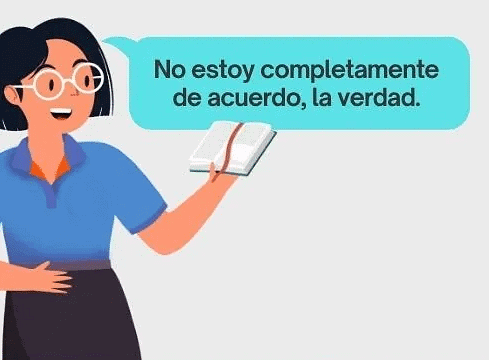
9. No me agrada eso. – I don’t like that.
¿Qué piensan de los servicios de transmisión?
—No me agrada eso; pasamos mucho tiempo en ellos.
What do you think of streaming services?
—I don’t like them; we spent too much time on them.
10. No lo veo de esa forma. – I don’t see it that way.
Yo pienso que eso tiene un impacto negative.
—No lo veo de esa forma; puede ser positivo.
I think that has a negative impact.
—I don’t see it that way; it could be positive.
11. Yo no pienso así. – I don’t think so.
Ese problema no se solucionará.
—Yo no pienso así; hay muchas opciones.
That problem won’t be solved.
—I don’t think so; there are many options.
12. Yo no pienso eso. – I don’t think that.
Tú crees que eso es justo.
—Yo no pienso eso para nada.
You think that’s fair.
—I don’t think that at all.
Formal Expressions To Disagree in Spanish
Here are some direct and polite phrases to use at your workplace:
13. Me temo que debo estar en desacuerdo. – I’m afraid I have to disagree.
No necesitamos hacer cambios a la estrategia.
—Me temo que debo estar en desacuerdo; los cambios nos ayudarán.
We don’t need to make changes to the strategy.
—I’m afraid I have to disagree; changes will help us.
Look at this similar expression:
a. Me temo que no. – I’m afraid not.
¿Podrás venir a la próxima reunión?
—Me temo que no, estaré de viaje.
Will you come to the next meeting?
—I’m afraid not, I will be out on a trip.

14. Estoy en contra de ello. – I’m against it.
Por favor, den su opinión sobre el team.
—Estoy en contra de ello; es una mala idea.
Please, give your opinion on the subject.
—I’m against it; it is a bad idea.
15. No estoy tan seguro de eso. – I’m not too sure about that.
Cometiste un error en el document.
—No estoy tan seguro de eso; lo revisé.
You made a mistake on the document.
—I’m not too sure about that; I checked it.
16. Lo siento, pero estás equivocado. – I’m sorry, but you’re wrong.
Estoy seguro de eso.
—Lo siento, pero estás equivocado.
I’m sure about that.
—I’m sorry, but you’re wrong.
17. Yo pienso que eso está mal. – I think that’s wrong.
Mira este reporte; ¿qué piensas?
—Yo pienso que eso está mal; deberías corregirlo.
Look at this report; what do you think?
—I think that’s wrong; you should correct it.
To be more direct, try to use this one:
a. Yo pienso que tú estás equivocado/a. – I think you’re wrong.
Esa es mi postura.
—Yo pienso que estás equivocado, pero podemos discutirlo.
That’s my position.
—I think you’re wrong, but we can discuss it.
18. Yo diría exactamente lo opuesto. – I would say the exact opposite.
Yo creo que podemos dar por terminada la reunión.
—Yo diría exactamente lo opuesto. Aún tenemos temas por discutir.
I think we can consider this meeting finished.
—I would say the exact opposite. We still have topics to discuss.
You can also use:
a. Yo no diría eso. – I wouldn’t say that.
¿Dices que debemos hacerlo todo de nuevo?
—Yo no diría eso; podemos hacer algunos cambios.
Are you saying that we should do it all over again?
—I wouldn’t say that; we can make some changes.
b. No, porque… – No, because…
¿No estás de acuerdo?
—No, porque podemos hacer algo mejor.
Don’t you agree?
—No, because we can do something better.
19. No necesariamente. – Not necessarily.
¿Deberíamos tener tres reuniones al mes?
—No necesariamente; dos son suficientes.
Should we have three meetings a month?
—Not necessarily; two is enough.

Disagree During Fluent Conversation
Fluency is your main goal when you’re learning a new language; you can express disagreement in fast-paced conversations with these amazing phrases:
20. No realmente. – Not really.
¿Quieres ir al cine más trade?
—Not really; I’m not in the mood.
Do you want to go to the movies later?
—No realmente; no tengo ganas.
a. Para nada. – Not at all.
¿Te molestaría ayudarme?
—Para nada; con gusto.
Would you mind giving me a hand?
—Not at all; my pleasure.

21. Por nada del mundo. – No way in the world.
¿Harías un salto de paracaídas?
—Por nada del mundo. ¡Qué miedo!
Would you ever jump with a parachute?
—No way in the world. It’s scary!
22. Claro que no. / Por supuesto que no. – Of course not.
¿Irías de nuevo a ese restaurant?
—Por supuesto que no. La comida estuvo fatal.
Would you go to that restaurant again?
—Of course not. Their food was awful.
23. Por el contrario. – On the contrary.
La tecnología tiene muchas desventajas.
—Por el contrario, la tecnología nos facilita muchas cosas.
Technology has too many disadvantages.
—On the contrary, technology makes a lot of things easier.
24. Eso es una locura. – That’s crazy.
Eso fue lo que dijo. ¿Debo creerle?
—Eso es una locura. No le creas.
That’s what she said. Should I believe her?
—That’s crazy. Don’t believe her.
25. Eso es diferente. – That’s different.
Son situaciones idénticas.
—No, eso es diferente para todos.
They are identical situations.
—No, that’s different for everyone.
26. Eso no me parece bien. – That doesn’t seem okay to me.
No deberíamos invitarlo.
—Eso no me parece bien. Es nuestro amigo.
We shouldn’t invite him.
—That doesn’t seem okay to me. He’s our friend.
27. Eso es imposible. – That’s impossible.
Es posible que lo despidan de su trabajo.
—Eso es imposible; él trabaja muy duro.
He might get fired from his job.
—That’s impossible; he’s a hard-worker.
28. Eso no tiene sentido. – That makes no sense.
Ese es mi plan.
—Eso no tiene sentido; deberías reconsiderarlo.
That’s my plan.
—That makes no sense; you should reconsider.
Another option is:
29. Eso me parece una tontería. – That looks like nonsense to me.
¿Cuál es tu opinión? Sé honest.
—Si soy honesto, eso me parece una tontería.
What’s your opinion? Be honest.
—If I’m being honest, that looks like nonsense to me.
30. Ese no es un buen punto. – That’s not a good point.
Estos son los puntos que abordaré en la reunión.
—Mira ese; ese no es un buen punto.
These are the points that I’ll address at the meeting.
—Look at that one; that’s not a good point.
31. Ese no siempre es el caso. – That’s not always the case.
Los niños deberían crecer con dos padres.
—Pero ese no siempre es el caso.
Kids should grow up with two parents.
—But that’s not always the case.
32. Eso no es correcto. – That’s not right.
Eso fue lo que dijo mi jefe.
—Eso no es correcto, deberías hablar con él.
That’s what my boss said.
—That’s not right, you should talk to him.
33. Ese no es el punto. – That’s not the point.
Estaba tratando de ayudar.
—Ese no es el punto, te equivocaste.
I was trying to help.
—That’s not the point, you made a mistake.
You can also pick other similar expressions:
a. Eso no es lo que quiero decir. – That’s not what I mean.
¿Estás tratando de culparme?
—Eso no es lo que quiero decir, escúchame.
Are you trying to blame me?
—That’s not what I mean; listen to me.
b. No estás entendiendo el punto. – You’re missing the point.
No estás entendiendo el punto; déjame explicarte.
You’re missing the point; let me explain.
34. Eso no es cierto. – That’s not true.
Todos los trabajos tienen sus desventajas.
—Eso no es cierto; yo amo mi trabajo.
All jobs have their disadvantages.
—That’s not true; I love my job.
a. Yo no pienso que eso sea cierto. – I don’t think that’s true.
¿Escuchaste que suspenderán los vuelos?
—Yo no pienso que eso sea cierto, es tarde para eso.
Did you hear they will cancel the flights?
—I don’t think that’s true; it’s late for that.
b. Eso no es completamente cierto. – That’s not entirely true.
Él dijo que estaría afuera de la ciudad.
—Eso no es completamente cierto; saldrá hasta la próxima semana.
He said he would be out of town.
—That’s not entirely true; he will be out until next week.
35. Esto es inaceptable. / Eso es inaceptable. – This/that is unacceptable.
No creo que sea una situación tan grave.
—Eso es inaceptable; piénsalo bien.
I don’t think that situation is too bad.
—That is unacceptable; think it through.
36. Sí, pero… – Yes, but…
Sabes que tengo un buen punto.
—Sí, pero no todo es blanco y negro.
You know I have a good point.
—Yes, but not everything is black and white.
37. No entiendes. – You don’t understand.
No podemos cancelar el viaje.
—No entiendes; no puedo viajar después.
We can’t cancel the trip.
—You don’t understand; I can’t travel any later.
38. Tienes que estar bromeando. – You have got to be kidding me.
Lo siento; tendré que cancelar nuestros planes.
—Tienes que estar bromeando; ya tenía la reservación.
I’m sorry; I will have to cancel our plans.
—You have got to be kidding me; I had the reservation already.
39. No sabes de lo que estás hablando. – You don’t know what you’re talking about.
Hacer eso no parece tan difícil.
—No sabes de lo que estás hablando; no estás en esa situación.
That doesn’t seem so hard to do.
—You don’t know what you’re talking about; you’re not in that situation.
40. Estás equivocado/a. – You’re wrong.
Deberías mudarte.
—Estás equivocado; no lo haré.
You should move out
—You’re wrong, I won’t.
a. No, yo pienso que estás equivocado/a. – No, I think you’re wrong.
¿Estás conmigo en esto?
—No, yo pienso que estás equivocado.
Are you with me on this?
—No, I think you’re wrong.
41. Aún no has considerado… – You still haven’t considered…
Esa es mi opinión final.
—Aún no has considerado todos los puntos de vista.
That’s my final opinion.
—You still haven’t considered all points of view.
Explain Your Point of View With “Because…” (Porque…)
While now you have a myriad of options to agree or disagree in Spanish, you also need to know how to express more than that. There are many phrases that can help you externalize your thoughts and feelings over certain subjects. Here is a useful list to give your opinion in Spanish.
1. Mi opinión es… – My opinion is…
Mi opinión sobre los deportes es poco común.
My opinion on sports is uncommon.
2. Yo creo que… – I believe that…
Yo creo que deberíamos planear unas vacaciones.
I think we should plan some vacation.
3. Yo pienso que… – I think that…
Exactamente. Yo pienso que ser político es un trabajo serio.
Exactly. I think that being a politician is a serious job.
4. Yo siento que… – I feel like…
¿Cambiarás de trabajo?
—Claro que no, yo siento que tengo una buena oportunidad ahora.
Will you leave your job?
—Of course not, I feel like I have a good opportunity now.
5. ¿Alguna vez has pensado en…? – Have you ever thought about…
¿Alguna vez has pensado en cómo eso afecta a otras personas?
Have you ever thought about how that affects other people?
6. He llegado a la conclusión de que… – I’ve come to the conclusion that…
Sí, y he llegado a la conclusión de que no quiero casarme.
Yes, and I’ve come to the conclusion that I don’t want to get married.
Express Your Opinion at the Workplace
Now, here are some expressions appropriate for the workplace or other situations that require formality.
7. La postura que yo tomo respecto a eso es… – The position I take in regard to that is…
La postura que yo tomo respecto a eso es distinta a la tuya.
The position I take in regard to that is different from yours.
8. Soy de la opinión de que… – I’m of the opinion that…
Soy de la opinión de que el trabajo en equipo es esencial.
I’m of the opinion that teamwork is essential.
9. Quiero expresar mi opinión…. – I want to express my opinion
Quiero expresar mi opinión en la siguiente presentación.
I want to express my opinion in the next presentation.
10. Esta es mi opinión… – This is my opinion…
Esta es mi opinión: debemos cambiar el proyecto.
This is my opinion: we should change the project.
11. ¿Quisieras mi opinión? – Would you like my opinion?
¿Quisieras mi opinión sobre tu presentación?
Would you like my opinion about your presentation?
12. ¿Alguna vez has considerado…? – Have you ever considered…?
¿Alguna vez has considerado invertir en una gran compañía?
Have you ever considered investing in a big company?
13. Estoy seguro de que… – I’m sure that…
Estoy seguro de que todo resultará bien.
I’m sure that everything will turn out fine.
14. He tenido mis dudas respecto a… – I’ve had my doubts regarding…
He tenido mis dudas respecto a los cambios que quieres hacer.
I’ve had my doubts regarding the changes that you want to make.
15. Eso es… – That is…
¡Eso es brillante! Felicitaciones.
That is brilliant! Congratulations.
16. Esa es mi opinión. – That’s my opinion.
Esa es mi opinión y no puedo cambiarla.
That is my opinion and I cannot change it.
Fluency Is One Step Away
If you’re wondering when you will use all the expressions you learned today to agree, disagree, or give your opinion in Spanish, there’s a simple way to find out!
Bilingualism is the key to open countless doors to greater job opportunities, traveling around the world, and enriching your knowledge of different cultures.
|
33 videos|38 docs|28 tests
|
FAQs on Showing Agreement or Disagreement - Spanish: Beginner A1 Level - Class 6
| 1. How can I express agreement in Spanish? |  |
| 2. What are some ways to disagree in Spanish? |  |
| 3. How can I explain my point of view using "porque" in Spanish? |  |
| 4. What are some common phrases to show agreement in a conversation in Spanish? |  |
| 5. How can I politely disagree with someone in Spanish? |  |















